Search
Did you mean: Nero?
Search Results
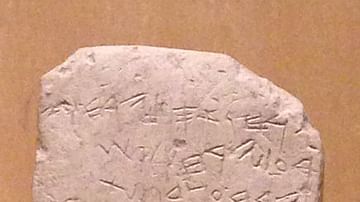
Definition
Gezer
Gezer is an ancient city and archaeological site located in central Israel where the central mountains meet the northern Shephelah, about 10 km southeast of the city of Ramleh. According to the Hebrew Bible, Gezer was one of the great cities...

Definition
Sargonid Dynasty
The Sargonid Dynasty was the last ruling house of the Neo-Assyrian Empire from 722-612 BCE, beginning with the reign of Sargon II and ending with fall of the Neo-Assyrian Empire. Some of the most famous kings in the history of Assyria come...
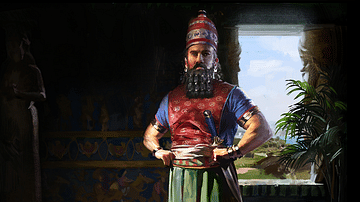
Image
King Ashurbanipal (Artist's Impression)
King Ashurbanipal (668-627 BCE) of the Neo-Assyrian Empire depicted in the game Old World.
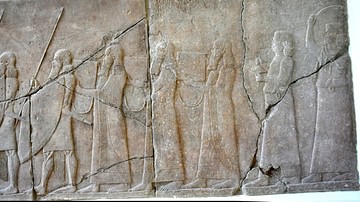
Image
Assyrian Wall Relief Depicting Musical Instruments
Alabaster bas relief depicting marching shield bearers accompanied by a group of musicians who carry different musical instruments, from Nineveh, northern Mesopotamia, Iraq, Neo-Assyrian Empire, reign of king Sennacherib, 705-681 BCE. The...
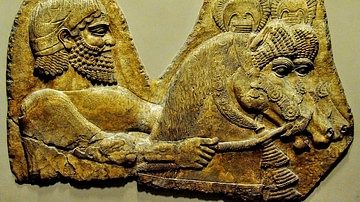
Image
A Groom and Horses from Western Assyria
This scene is part of a large alabaster bas-relief which shows a tributary procession from Western Assyria (probably in modern-day Syria or Turkey). Here, we can see a groom leading two horses. From Khorsabad (ancient Dur-Sharrukin), in modern-day...
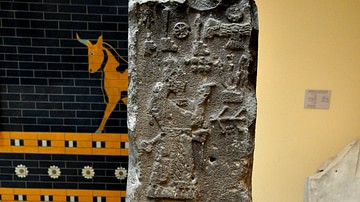
Image
Stela of the Assyrian King Adad Nirari III
Stela of Adad Nirari III, erected by one of the king's local governors, Nergal-Eres, found in Saba, Neo-Assyrian Empire, 810-783 BCE. The stela features the Assyrian King Adad Nirari III praying in front of god symbols, and the inscriptions...
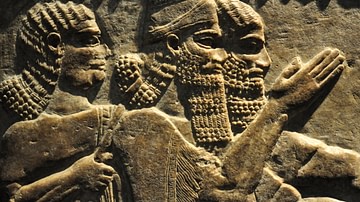
Image
Tiglath Pileser III
Detail of a gypsum wall relief showing the Assyrian king Tiglath Pileser III from the South-West palace at Nimrud, Mesopotamia, modern-day Iraq, Neo-Assyrian Empire, 745-727 BCE. The king is recognizable by his long beard, royal head cap...
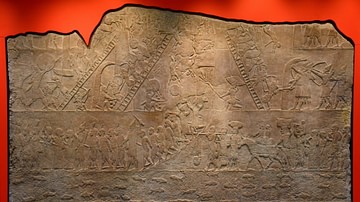
Image
Assyrian Army Attacking Memphis
Gypsum panel showing the Assyrian army attacking the Egyptian city of Memphis and commemorating the final victory of the Assyrian king Ashurbanipal II over the Egyptian king Taharqa in 667 BCE. Panel 17, Room M of the North Palace at Nineveh...
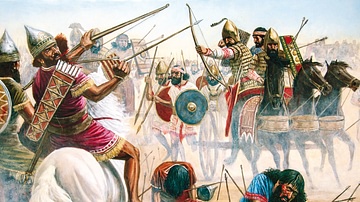
Image
Battle of Qarqar
Illustration of the Battle of Qarqar in 853 BCE between the Neo-Assyrian Empire led by Shalmaneser III and an alliance of twelve kings who waged war against him. Illustration by by Seán Ó’Brógáín.
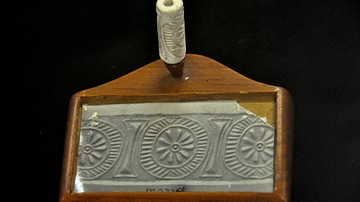
Article
Cylinder Seals in Ancient Mesopotamia - Their History and Significance
Among the most interesting and revealing artifacts discovered from ancient Mesopotamia are cylinder seals. These fairly small items may be seen today in museum exhibits around the world but, perhaps owing to their size, they are not given...